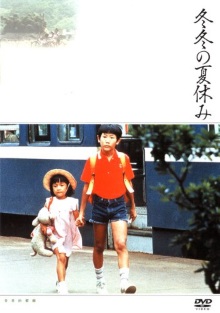
It looks like we’re in for a busy week for I’m sticking to more easily digestible fare. This is another film by Hou Hsiao-hsien whose more recent works tend towards the obscure. My wife has watched this one before however and she reports that it’s an example of the director’s earlier works which uses simpler storytelling. Indeed this turned out to be straightforward to understand yet is laden with emotion and nuance.
A young boy, Dong Dong, and his younger sister normally live in Taipei with their parents. Unfortunately as their mother will be hospitalized for a lengthy period in preparation for an operation, they are sent to live with their grandfather in the countryside over the summer. Accompanying them are their uncle, their mother’s younger brother, and his girlfriend. What follows is an almost ideal account of a young boy’s summer. He befriends a group of local boys by trading his remote-control toy car with one of them in exchange for a large turtle. They bully the little sister by refusing to let her follow them when they go out to play so she pranks them back by throwing away all their clothes when they go swimming. Meanwhile he observes as the adults deal with various challenges such as his uncle getting his girlfriend pregnant before they are married, a robbery in the village and a woman with mental problems who wanders the streets. He also worries about his mother’s health and face the possibility that she might die.
Few of those of who are reading this would have grown up in Taiwan, let alone done so during the time in which this film is set. Nonetheless there is a timeless quality here that evokes a powerful sense of nostalgia in just about everyone who watches it. Amidst the idyllic setting of small houses, winding lanes, rice fields and forests, Dong Dong indulges in all of the classical pastimes of boyhood: catching fish, climbing trees, walking on railway tracks and even bullying the little sister and getting beaten up by older gangsters in turn. In between, he also does his homework, spends time poring over old photographs with his grandfather and obediently recites Chinese poetry. There is no grand plan as the days pass and so there is no real main plot. Though matters of import occur, Dong Dong has little power to alter the course of events so he listens and learns as a part of growing up. This really is a picture perfect depiction of a boy spending his summer in the countryside.
I’m especially appreciative of the latter part. It would be all too easy for Hou to frame this as a purely lighthearted collection of happy memories and funny moments. Instead this shows a coming of age process in which Dong Dong realizes the flaws and limitations of adults. A recurring shot is a close-up of his face as he watches adults doing bad deeds. It’s not only that they often fail to live up to the moral standards that they are taught, it’s also that they makes mistakes or are negligent. One fascinating scene has his sister almost die in an accident, with Dong Dong himself being partially at fault. Neither of them end up telling their guardians about the incident yet it indelibly marks them. It’s not just the fact that they had a near-death experience, it’s also that they didn’t tell anyone and life went on with the adults none the wiser.
All in all this is another fantastic film by the master director. It may be light in tone but definitely is not in substance. It’s a wonderful film about boyhood and its rose-tinted view of a summer spent in the countryside pulls on the heartstrings of even on us city-living folks.
2 thoughts on “A Summer at Grandpa’s (1984)”